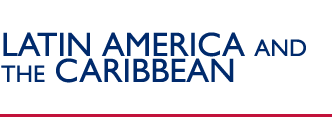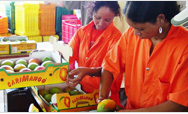
Having clean drinking water for the first time in their lives is a joyful occasion for these Honduran children.
Honduras Snapshot
Date of independence: 1821
Population: 7.0 million (2004)
Income per person: $1,040 (yr)
USAID IN Honduras
http://www.usaid.gov/hn/
|
CONTACT INFORMATION
Mission Director
William Brands
USAID/Tegucigalpa, Unit #2927
APO AA 34022-2927
Tel: 9-011-504-236-9320
Desk Officer (Washington)
Cynthia Judge
Honduras Desk Officer
Tel: 202-712-4985
E-mail: cjudge@usaid.gov
|
|
Overview
Since its return to a democratic government in 1980, Honduras has remained politically stable and is continuously striving to maintain an independent judicial system. Targeted technical assistance has provided the needed organizational structure to increase the economic stability of the country, despite the perceived levels of gang related crime, violence, and corruption. Honduras continues to promote consistent economic practices to achieve rapid and sustained economic growth. Nontraditional exports have soared, providing employment to many Hondurans, and the country hopes to continue expanding exports and providing credit for microenterprises.
Plans for diversification of agricultural production will lead to the improvement of food security as well as increases in environmental protection. Hundreds of thousands of hectares are under improved management as national parks or wildlife refuges, and the country has improved access to safe drinking water. This leads to improved sanitary conditions and when combined with Honduras’s reduced infant mortality and illiteracy rates, demonstrates the country’s commitment to increasing living standards for its citizens.
Programs
Economic Growth
USAID assists the Government of Honduras (GOH) with participation in trade agreements and following best investment practices. Reforming economic policies and facilitating business growth are also key components at the national level. Small and microenterprises receive USAID support for financial services and assistance in improving business linkages. Farmers receive USAID assistance for crop improvement and diversification, which results in higher quality agricultural production.
Democracy and Governance
Improving municipal capacity, increasing civil society participation and strengthening the rule of law are priorities of USAID programs. USAID promotes the improvement of municipal services such as garbage collection, water supply, and waste management in order to respond to citizen needs. Citizen’s participation in local decision making processes and anticorruption activities are supported to increase transparency and accountability in the management of public funds. USAID has continued targeted assistance to fine tune the implementation of Honduras’s Criminal Procedure Code which was passed in 2002; and is now supporting stakeholders who are promoting the passage of the new Code of Civil Procedure which will help secure commercial transactions under the Central America - Dominican Republic (CAFTA-DR) Free Trade Agreement.
Health and Education
USAID is targeting maternal and child health and family planning services in areas of highest need, mostly in western Honduras. Child health activities ex-pand on the successful Integrated Community Child Health Program, which emphasizes basic prevention and treatment services and referrals by trained community volunteers. The P.L. 480 Program assists vulnerable populations in extremely poor municipalities of western and southern Honduras through: in-creased food availability and access; improved utilization of food by the body through adequate maternal child care and reproductive health care; and im-proved departmental, municipal and community capacity for strategic devel-opment.
USAID activities improve the quality and reach of primary and vocational edu-cation for children and young adults in Honduras. One program develops technology-based, alternative delivery systems for pre-school and secondary education to youth from low-income families. Working in collaboration with the Honduras Ministry of Education, USAID also develops educational standards that include strategies for testing and evaluation as well as a plan to decentral-ize education management to the local level.
Environment and Disaster Assistance
A primary focus of USAID’s efforts in Honduras is directed at the management of watersheds and other protected areas. Projects involve environmental au-dits and management systems to decrease pollution and unsustainable use of natural resources. Projects also focus on the development and strengthening of environmental policies regarding water and forest management at the na-tional level. Program funding helps create information systems that manage natural resources and trains local officials in disaster preparedness, such as monitoring river and stream flow data to protect against floods.
|


